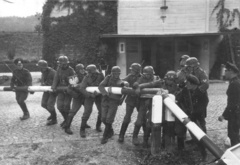 Seventy years ago today, and only a week after the Molotov–Ribbentrop Pact had been signed, a Nazi German battleship opened fire on a Polish fort on the Westerplatte peninsula outside Gdansk and began the Second World War.
Seventy years ago today, and only a week after the Molotov–Ribbentrop Pact had been signed, a Nazi German battleship opened fire on a Polish fort on the Westerplatte peninsula outside Gdansk and began the Second World War.
For my family living in Poland, the onslaught of war would change everything. Henrik and Karolina Finkel, having seen their parents and siblings wiped out not long after the German invasion, disguised themselves as Catholics and lived a make-belief life outside the Warsaw Ghetto. Henrik, an inventive man who was born in Vienna and originally named Heinrich (his brother was, believe it or not, called Adolph), changed the family surname from Finkel to Korski (with my grandmother taking the name Korgut so as to pretend to be cohabitating with, but not married to, Henrik). He had by then moved the family from Lvov to Warsaw, which by then had been overrun by the Soviet Union as part of the Ribbentrop-Molotov agreement.
Pretending to be normal Poles, Henrik and Lina, as she was called, used their excellent German to work as translators in a bakery and a post office. Having been given a tip by someone in the resistance movement, in 1943 my grandparents were taken in by a heroic Polish lady called Anastasia Brodziak, who they had never met before they rang her doorbell and asked for her help. They probably stayed with her for the remainder of the war and no doubt survived because of her support, though they had a number of close-run encounters with the Nazis. In 1996 I went to see the by-then elderly Mrs Brodziak in Warsaw to honour her. She died a few years later, having outlived not only Hitler and Stalin but many of the people she helped during the war.
My maternal grandparents, Moses and Ita Wajntraub who had lived in Warsaw in the run-up to the war, escaped by fleeing thousands of miles east to Uzbekistan in late 1939 or early 1940. Alongside more than one million Jews from the former Soviet Union, including the by-then recently annexed territories of Eastern Poland, Baltic countries, Bessarabia and Northern Bukovina, survived the war in Central Asia. My grandmother had to leave her family behind, including her mother, who refused to believe that the Germans would stay in Poland long. Out of eleven siblings, only four survived the war. Moses and Ita stayed in Uzebkistan until 1946, living in Tashkent and Jizzakh, northeast of Samarkand. They worked as lumber jacks, living in the forests and sleeping on the forest floor. When the war ended, the Wajntraubs were shipped back to Poland and re-settled in a western part of the country that had, until the war, been German. Both sets of grandparents were later hounded out of Poland as the Polish Communist Party embraced the anti-Semitism that had caused both sides of my family so much grief only a few years previously.
Today is a day to remember the victims and those who struggled to survive the terrible consequences of World War II. The newspapers have been full of President Medvedev’s rejection that the Soviet Union should be seen as one of the World War II aggressors. But within a month of the September 1 attack, Poland was overwhelmed by the Nazi blitzkrieg from the west, and an attack two weeks later from the east by forces from the Soviet Union, which had signed a pact with Hitler’s Germany. Even if this is hard to accept by some in Russia’s political elite today, Henrik, Lina, Ita and Moses knew the truth.






Comments